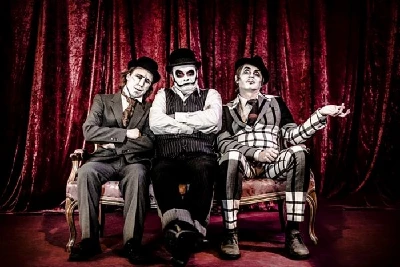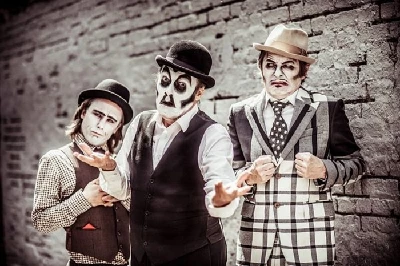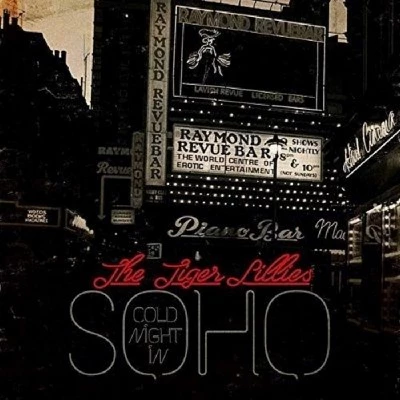published: 17 /
3 /
2017

John Clarkson speaks to Martyn Jacques, the front man with alternative pop/rock group the Tiger Lillies, about his band's new album 'Cold Night in Soho', which was inspired by ten years he spent living in Soho in the 1980's
Article
With singer Martyn Jaques' unique falsetto vocals and their music - a combination of Kurt Weill-influenced cabaret, vaudeville, torch song balladry and punk - the Tiger Lillies are a distinctive voice in alternative pop and rock.
'Cold Night in Soho', their latest album, is something of a departure for the Tiger Lillies, being their first album in a decade not to be associated with a theatrical or other show.
Inspired by the ten years Jaques spent living in the 1980's in Rupert Street in the heart of Soho, it tells of its lost past with its now closed sex shops, revue bars and porn cinemas and the prostitutes, junkies, pimps and alcoholics who used to inhabit it.
Jaques paints a darkly colourful picture of Soho in its last years before real estate agents and developers took it over in the early 1990's. On the starkly mournful and piano-led opening track the 'Salvation Army' of the title tries and fails to save souls. The exuberant, frenzied 'Dance Hall' - Jacques' accordion at the fore - tells of the Tiger Lillies' raucous early gigs in an underworld of rough bars and after hours clubs, while the ten-minute final title track is an epic, scorched torch ballad about a drug-addicted prostitute who was murdered by a client that she had tried to rip off.
The Tiger Lillies also features on this recording, as well as Jaques (vocals, accordion, piano, organ, guitar, lap steel guitar, harmonium and darbuka), it other long-term member Adrian Stout (upright bass, saw, euphonium, guitar and backing vocals) and newer recruit Timothy Remfrey (drums).
Pennyblackmusic spoke to Martyn Jaques a few days before the Tiger Lillies played a show at the Roundhouse in London about 'Cold Night in Soho'
PB: ‘Cold Night in Soho’ describes a bleak world of prostitutes, junkies and vice, yet you seem almost grimly nostalgic about it. How much of that is down to the nostalgia of youth and how much of that is down to the fact that Soho like so much of London had a lot more character before it was cleaned up?
MJ: I would say that it was because of both really. I lived in Soho for about ten years and from my early twenties until I was about thirty. It was a pretty rough and dangerous kind of place but I had a pretty good time when I was living there, so I guess there is an element of nostalgia to it.
Soho also did have more character back then. I can actually remember towards the end of my time there that you would see estate agents in their expensive suits starting to walk around. Flats became a lot more expensive there to rent around that time and the area began to be taken over by yuppies. It lost then and it is continuing to lose now a lot of its character.
PB: You were brought up in Slough. How did you end up coming from there to living in Soho?
MJ: Slough is grim. There is nothing really there. I just wanted to get out of Slough, and so I went to London. I lived in squats around Finsbury Park for a few years, and then in the end I got a flat in Rupert Street in Soho above a brothel. I knew a few of the girls who worked in clip joints, and I got the flat through one of them.
PB: On the opening track the ‘Salvation Army' of the title make frequent trips into Soho to save people but to no avail. Were they a regular sight on the streets of Soho in the 1980's?
MJ: Yeah, they were a fairly regular sight. I used to look out over Rupert Street, and they would be there. They would be on one side of the street playing their instruments, and on the other side there used to be the girls and the bouncers. There was a lot of good-natured abuse between them. It wasn’t bad tempered or anything. There wasn’t any real aggression, at least when I was watching. The people that ran the bars didn’t particularly want the Salvation Army there because they would pretty much destroy their custom. None of the customers would go into a bar if the Salvation Army was standing there, but at the same time they didn’t stay in one place for too long. You would see them doing their hail and brimstone thing quite often and standing there in their Victorian costumes and old brass instruments amidst all this neon and the girls with their high heels and the dodgy bouncers on the other side of the street watching them. I like that image a lot, and it became one of the main inspirations for the album.
PB: ‘Dance Floor’ tells of some of your early gigs with the Tiger Lillies. They sound like wild but distinctly down-at-heel affairs. Is that how you remember them?
MJ: Yes, they were down-at-heel. They were fun as well. The band used to play in some pretty rough dives - afterhours clubs and pubs - and there would be fights. People would be abusive sometimes but a lot of people loved us. They would dance. They would stamp on the floorboards. There were people in the crowd who hated us but there was a hell of a lot more that loved us, so we always felt fairly safe. Sometimes there would be fights because people would talk and other people wouldn’t be very happy about them talking when they were on. It was a great time though but I wouldn’t want to go back to it. I am happy to be playing in the Roundhouse now and not in a little club in Islington or Soho.
PB: The title track tells of the murder of a prostitute. Was she a real life character?
MJ: Yeah, she was a real life character. She was a clipper. A clipper is someone who fools men into giving them money with the promise that there is a girl in a flat. Sometimes these clippers used to give the men the keys with the address. They would go there and there would be nobody or nothing there, and they had given them £50 or something as a deposit for the key. These girls all would have clever ways of tricking men out of their money.
It was a girl that used to work on the corner of Rupert Street directly outside my flat, and I would see her every day working, and then one day it was announced in the papers that she had been murdered. She was killed in Rupert Court, which is actually on the other side of Shaftesbury Avenue from Rupert Street but literally one minute away. I was very shocked by that. The title song is about her murder.
PB: There is nobody around making music quite like the Tiger Lillies. The influence of Kurt Weill and vaudeville theatre is fairly clear but you are in your mid Fifties now and of an age though in which you must have experienced punk first hand. How much of an influence was that?
MJ: I never went to punk concerts. I was a little bit late to do that by the time I got to London in 1980. I didn’t really experience it first hand, but I was very inspired by its attitude. The spirit of a lot of what it stood for was quite inspiring to me. Punk is a very broad category. There are lots of very different artists within its umbrella, and I think it is funny when people say we are ‘punk’ or ‘punk cabaret’. It doesn’t bother me though. I am pleased when people describe us as punks.
PB: You have got an incredible voice. Do you have to do a lot to protect it and preserve it?
MJ: No, nothing at all. It is funny because there was a throat surgeon at my last concert in Paris. We have just come back from playing three nights at the Philharmonic in Paris, and this throat surgeon who deals with opera singers’ problems and throats, listened and he could hear that my voice was very, very undamaged ad very relaxed.
I think that I have been just blessed with an instinctive technique which means that, despite singing for a long time, I have always managed never really to do any damage to my voice. Another thing that I am learning is to sing more quietly and to let the microphone do the work. That is something, of course, that opera singers don’t have the luxury of. I am like an electric guitar compared to an acoustic guitar. You let the pick ups work for you when you are playing the electric guitar. I concentrate on producing the sound but I don’t actually sing as loud as I can. That is the secret of using microphones when you sing.
PB: You are about to play the Roundhouse in London. What are your plans for the future after that?
MJ: We have got lots going on. It is mainly shows. We are doing a tour of central Europe and will be playing shows in Austria and Southern Germany in March. We did a show before Christmas about soup kitchens and homeless people. Next week we are going to Paris and rehearsing a version of a new show about Edgar Allan Poe, and then we have got other shows as well. We are also doing a version of ’The Ancient Mariner’, which is an old show of ours In Berlin this Spring. We are putting together as well a new version of Shakespeare’s ‘Hamlet’ which we will be taking to Italy and South America later in the year.
PB: Thank you.
Band Links:-
https://www.tigerlillies.com/
https://en-gb.facebook.com/The-Tiger-L
https://twitter.com/thetigerlillies
Picture Gallery:-

